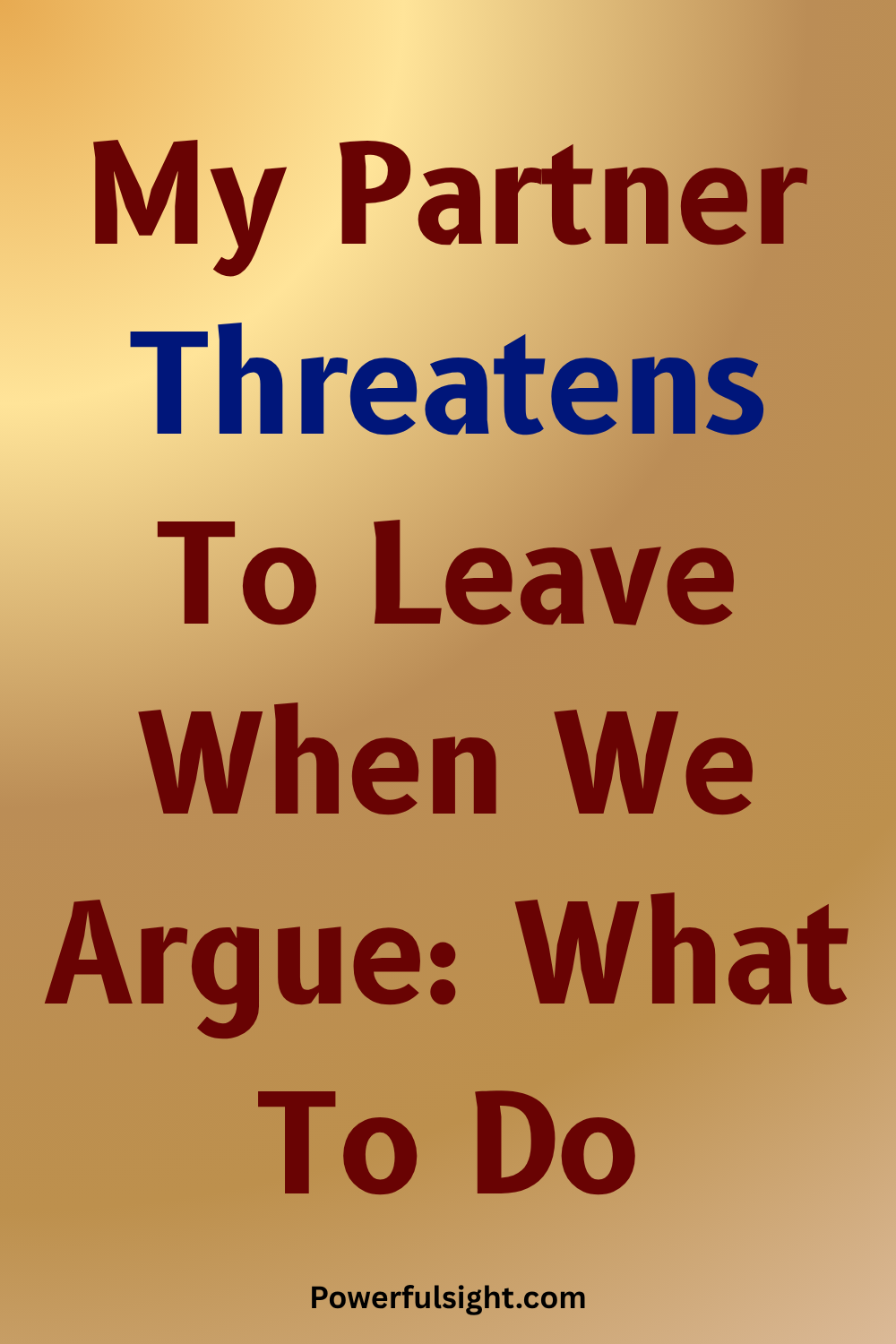Arguments are normal in any relationship. You won’t always see eye to eye on every topic, no matter how much you love your partner. But when your partner resorts to threats every time you disagree, it creates emotional chaos.
When you’re arguing, all you want is to express your point of view and reach an understanding. But then your partner throws, “Maybe we should just break up,” or “I’m done with this,” in your face. They leave you feeling lost, confused, and emotionally unsafe.
Endless threats to end the relationship whenever an argument starts aren’t about fighting. They’re about fear, control, and communication.
This behavior will take a toll on your emotional health and the trust you’ve both built. Let’s look at what it really means when a partner threatens to leave, why they do it, and how to respond without losing your emotional stability.

The Problem with Abandonment Threats During Arguments
Couples argue—that’s a fact. Disagreements can actually build strength and connection if both partners can discuss respectfully. But if, every time you argue, your partner brings up leaving, it completely alters the tone of the conversation.
It’s no longer about finding a solution. Instead, it becomes about whether or not the relationship will survive this fight. Everything turns into a question of emotional security. You start tiptoeing around certain issues to avoid conflict, which ultimately weakens intimacy and trust.
The problem is, some people use leaving as an emotional weapon. It’s a shield they put up to avoid feeling hurt, rejected, or powerless. Others use it to manipulate their partner into backing down. Either way, it creates a serious lack of emotional safety, and no relationship can thrive on fear.
Related: Why Do People Cheat in Relationships?
Why Your Partner Threatens to Leave Every Time You Fight
Understanding the why behind this behavior is key to knowing how to respond. In most cases, your partner doesn’t truly want to leave. This reaction is often the result of deeper, unresolved emotional issues.
Related: 15 Clear Signs You Have Daddy Issues As A Woman
1. Avoiding Vulnerability
Some people struggle to handle emotional conflict. They feel overly exposed or powerless when arguments escalate. Threatening to leave becomes their way of “fighting back.”
They’re not necessarily trying to be cruel—they’re just defending themselves in the only way they know how.
Related: 12 Daily Habits To Stay Happy In A Relationship
2. Learned Behavior
If your partner grew up in a home where people walked out during fights or used emotional withdrawal as punishment, they’re likely repeating that same pattern subconsciously as an adult.
It’s simply how they learned to handle conflict.
Related: How To Handle Age Difference In A Relationship
3. Control and Manipulation
Unfortunately, some people use this emotional weapon as a means of control. It plays on your heartstrings and turns every disagreement into a power struggle. Over time, this imbalance gives the threatening partner more control in the relationship.
Related: 8 Signs You Are in a Narcissistic Relationship
4. Lack of Communication Skills
In some cases, your partner may simply not know how to express disappointment or frustration in a healthy way. They revert to threats because it’s easier than listening or staying emotionally present.
Related: How to Overcome Trust Issues
5. Feeling Emotionally Burned Out
Sometimes, the partner who threatens to leave is genuinely emotionally exhausted. They may feel trapped, unheard, or unappreciated, but lack the communication skills to express this calmly—so they reach for the easiest emotional escape route.
The Emotional Impact
Repeated threats to leave—even when your partner doesn’t mean them—can have a lasting negative effect on your emotional well-being.
You Feel Emotionally Unstable
You never know if the relationship will survive each fight. Every argument feels like the end, and that uncertainty leads to anxiety and emotional instability.
You Stop Speaking Up
Afraid of triggering another breakup threat, you start holding back your needs and opinions just to avoid conflict.
You Start Questioning Yourself
When someone threatens to leave you, it chips away at your self-esteem. You may begin to believe their love is conditional.
You Experience Emotional Drain
Constantly being on edge, fearing abandonment, and trying to keep the peace drains your emotional energy.
Love should feel safe—even when things get difficult. If your relationship feels more like walking a tightrope than a partnership, it’s time to change the dynamic.
How to Respond When Your Partner Threatens to Leave
You can’t control your partner’s behavior, but you can control your reactions and set healthy emotional boundaries.
1. Don’t Panic
When someone you love says they want to leave, panic is a natural response. Your instinct is to fix it—to apologize, plead, or promise to change.
Pause. Breathe. The more you react emotionally, the more likely the behavior will repeat. Stay calm and collected.
You can say:
“I don’t want to end this relationship, but I also can’t keep doing this every time we disagree. Let’s talk later when we’re both calmer.”
By staying composed, you show emotional strength and discourage drama-driven reactions.
2. Talk to Them Afterwards
Never try to resolve deep emotional issues in the heat of the moment. Wait until both of you are calm—whether that’s an hour later or the next day.
You can say:
“When we argue, you often say you want to leave. That makes me feel hurt and insecure about our relationship. Can we talk about why that happens?”
This non-accusatory approach opens the door to a real conversation rather than another argument.
3. Set Emotional Boundaries
You deserve to feel safe in your relationship. If the threats are a recurring habit, make it clear that this behavior is unacceptable.
You might say:
“It’s not okay for you to threaten to leave every time we argue. If we’re going to make this work, we both need to handle conflict differently.”
Setting boundaries isn’t about ultimatums—it’s about protecting your peace.
4. Patterns vs. Episodes
If it happens once, it may be a moment of frustration. But if it happens repeatedly, it’s a pattern. Pay attention to how often these threats occur.
Ask yourself:
-
Is my partner truly unhappy, or are they using this as manipulation?
-
Does this happen every time we argue?
-
Am I always the one apologizing afterward?
Repeated emotional threats signal deeper relationship issues that need to be addressed.
5. Stay Grounded in Reality
Emotions magnify everything. If your partner storms out or says they’re leaving, let them cool off. Space can be healthy—but only when it’s used for reflection, not punishment.
If they consistently use threats to control or silence you, that’s emotional manipulation, not love.
6. Encourage Healthier Communication
If your partner is open to improving, suggest learning healthier ways to communicate. Couples therapy, self-help books, or workshops can make a real difference.
You can say:
“I don’t want us to keep arguing like this. It hurts both of us. Can we work on communicating better when we’re upset?”
This approach invites teamwork instead of defensiveness.
7. Take Care of Your Emotional Health
If the threats continue despite your efforts, prioritize yourself. Constant emotional stress can lead to anxiety, self-doubt, and even trauma responses.
Talk to a trusted friend, or consider therapy to regain clarity and self-confidence.
8. Know Your Limit
If your partner refuses to change and continues to use emotional threats as leverage, take their words seriously. You cannot sustain a relationship that relies on fear.
Love is not about winning arguments—it’s about mutual respect. You deserve a partner who can disagree without threatening to walk away.
Repairing Safety and Trust
If both of you are willing to change, healing is possible—but it takes time and consistency.
1. Build Emotional Safety
Reassure each other that disagreements don’t mean the relationship is ending. Establish ground rules such as:
-
No threats of leaving during conflicts.
-
It’s okay to take a break, but always come back to talk.
-
Focus on the problem, not on attacking each other.
These small agreements can slowly rebuild trust.
2. Practice Emotional Regulation
Both partners must learn to manage anger and frustration without resorting to threats or silence. This might mean taking a walk, writing down feelings, or simply pausing before responding.
The goal is not to avoid emotion but to handle it maturely.
3. Talk When Calm
Schedule calm conversations about recurring issues rather than trying to fix things mid-argument. Ask questions that encourage understanding, like:
-
“What makes you feel unheard during our arguments?”
-
“What can I do differently when we disagree?”
-
“What would help you feel more secure in this relationship?”
Listening with genuine curiosity fosters emotional closeness.
When to Get Outside Help
If the threats are frequent, manipulative, or emotionally abusive, seek professional help. A counselor can identify underlying issues and teach both partners better communication and boundary-setting skills.
However, if your partner refuses therapy, dismisses your feelings, or continues using emotional threats as control, it may be time to rethink the relationship. You deserve a love that feels safe, not fearful.
What If You’re the One Who Threatens to Leave?
Sometimes, people realize they’re the ones saying “I’ll leave” during fights. If that’s you, there’s room for change.
You might be reacting from fear rather than manipulation. The key is awareness. The next time you feel overwhelmed, pause and identify your real emotion:
“I’m hurt,” or “I feel cornered right now.”
Being vulnerable takes more strength than issuing threats. Honest communication builds connection instead of fear. If needed, consider therapy to unlearn this habit.
Final Words
If your partner threatens to leave every time you fight, it’s not necessarily the end—but it is a warning sign. It shows emotional instability that must be addressed.
You can’t force your partner to change, but you can choose how much emotional turmoil you allow into your life.
Healthy love doesn’t weaponize your fears or insecurities. It listens, learns, and stays grounded even in conflict.
If your partner truly values you, they’ll learn that love isn’t about walking away during hard times—it’s about facing them together. And if they don’t, remember this: you have the strength to find peace within yourself, with or without them.
You deserve to feel emotionally safe, respected, and loved—without the constant fear of being abandoned. That’s the kind of love worth holding on to.
Save the pin for later.

- How to Stop Arguing Over Small Things - 07/12/2025
- 10 Signs Your Partner Genuinely Respects You - 06/12/2025
- 15 Things That Destroy Relationship Slowly - 06/12/2025